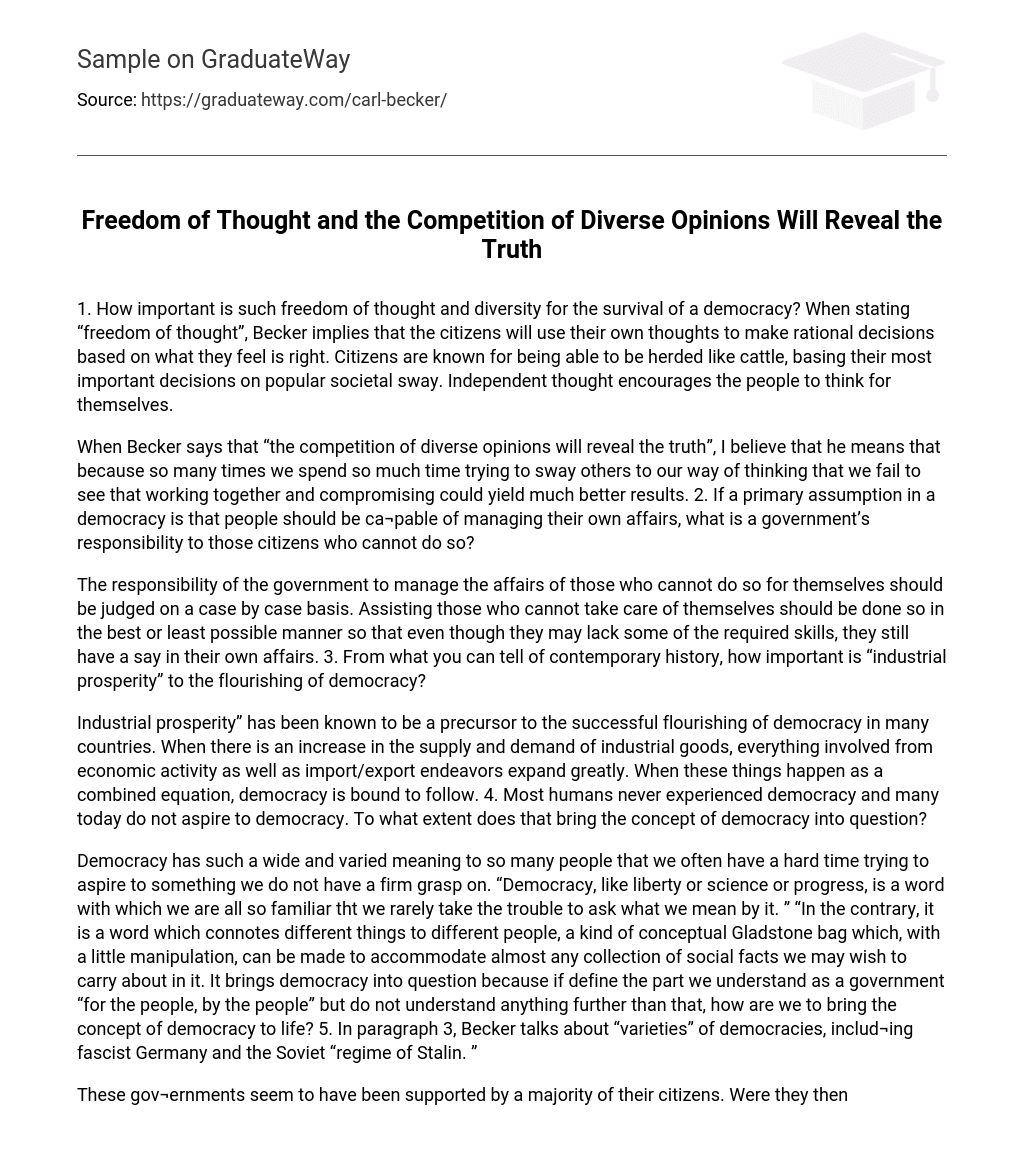1. How important is such freedom of thought and diversity for the survival of a democracy? When stating “freedom of thought”, Becker implies that the citizens will use their own thoughts to make rational decisions based on what they feel is right. Citizens are known for being able to be herded like cattle, basing their most important decisions on popular societal sway. Independent thought encourages the people to think for themselves.
When Becker says that “the competition of diverse opinions will reveal the truth”, I believe that he means that because so many times we spend so much time trying to sway others to our way of thinking that we fail to see that working together and compromising could yield much better results. 2. If a primary assumption in a democracy is that people should be ca¬pable of managing their own affairs, what is a government’s responsibility to those citizens who cannot do so?
The responsibility of the government to manage the affairs of those who cannot do so for themselves should be judged on a case by case basis. Assisting those who cannot take care of themselves should be done so in the best or least possible manner so that even though they may lack some of the required skills, they still have a say in their own affairs. 3. From what you can tell of contemporary history, how important is “industrial prosperity” to the flourishing of democracy?
Industrial prosperity” has been known to be a precursor to the successful flourishing of democracy in many countries. When there is an increase in the supply and demand of industrial goods, everything involved from economic activity as well as import/export endeavors expand greatly. When these things happen as a combined equation, democracy is bound to follow. 4. Most humans never experienced democracy and many today do not aspire to democracy. To what extent does that bring the concept of democracy into question?
Democracy has such a wide and varied meaning to so many people that we often have a hard time trying to aspire to something we do not have a firm grasp on. “Democracy, like liberty or science or progress, is a word with which we are all so familiar tht we rarely take the trouble to ask what we mean by it. ” “In the contrary, it is a word which connotes different things to different people, a kind of conceptual Gladstone bag which, with a little manipulation, can be made to accommodate almost any collection of social facts we may wish to carry about in it. It brings democracy into question because if define the part we understand as a government “for the people, by the people” but do not understand anything further than that, how are we to bring the concept of democracy to life? 5. In paragraph 3, Becker talks about “varieties” of democracies, includ¬ing fascist Germany and the Soviet “regime of Stalin. ”
These gov¬ernments seem to have been supported by a majority of their citizens. Were they then true democracies? In a sense they were if you define democracy as merely “a government for the people, by the people. In this context, then I do believe that they were, indeed, democracies because they supported the wishes of the citizens. It is when the governments begin to support their own agendas over those of their peoples, that they begin to convert themselves into another form of government. 6. How true is it that “virtually all forms of government are democratic, since virtually all governments, except in times of revolution, rest upon the explicit or implicit consent of the people” (para. 3)?
I don’t believe that it is true at all. Take the country of China, for example, a communist country. Communism can be loosely defined as a system of government in which the state plans and controls the economy and a single party holds the power. This is a type of government which does not base its opinions on the well-being of its citizens but of the wishes of a single ruler. If the people are not happy with their ruler’s decisions, their only other option if to rebel which would be a time of revolution.





